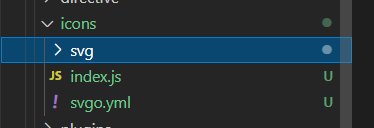- 安装svgo svg-sprite-loader
cnpm install svgo --save
cnpm install svg-sprite-loader --save-dev
- 新建vue.config.js
const path = require('path')
function resolve(dir) {
return path.join(__dirname, dir)
}
module.exports = {
publicPath: process.env.NODE_ENV === "production" ? "./" : "/", // 部署生产环境和开发环境下的URL
outputDir: process.env.NODE_ENV === 'test' ? 'test' : 'dist',//配置这个地方, // 构建输出目录(npm run build 或 yarn build 时 ,生成文件的目录名称)
assetsDir: 'assets', // 用于放置生成的静态资源(js、css、img、fonts)的;(项目打包之后,静态资源会放在这个文件夹下)
lintOnSave: true, // 是否开启eslint保存检测,有效值:ture | false | 'error'
runtimeCompiler: false, // 是否使用包含运行时编译器的Vue核心的构建
transpileDependencies: [], // 默认情况下 babel-loader 忽略其中的所有文件 node_modules,这里可增加例外的依赖包名
productionSourceMap: false, // 是否在构建生产包时生成 sourceMap 文件,false将提高构建速度
filenameHashing: false, //默认情况下,生成的静态资源在它们的文件名中包含了 hash 以便更好的控制缓存。你可以通过将这个选项设为 false 来关闭文件名哈希。(false的时候就是让原来的文件名不改变)
// https://cli.vuejs.org/guide/webpack.html#simple-configuration
configureWebpack: (config) => {
//webpack-bundle-analyzer 插件
const BundleAnalyzerPlugin = require('webpack-bundle-analyzer').BundleAnalyzerPlugin
if (process.env.NODE_ENV === 'production') {
return {
plugins: [
new BundleAnalyzerPlugin()
]
}
}
},
// webpack 链接 API,用于生成和修改 webapck 配置
// https://github.com/mozilla-neutrino/webpack-chain
chainWebpack: config => {
config.module
.rule('svg')
.exclude.add(resolve('src/icons'))
.end()
config.module
.rule('icons')
.test(/.svg$/)
.include.add(resolve('src/icons'))
.end()
.use('svg-sprite-loader')
.loader('svg-sprite-loader')
.options({
symbolId: 'icon-[name]'
})
.end()
},
// 支持webPack-dev-server的所有选项
devServer: {
open: true, // 是否自动启动浏览器
host: '192.168.0.245',
port: 3000, // 端口号
https: false,
hotOnly: false,
proxy: null,
// proxy: { // 配置多个代理
// '/api': {
// target: '<url>',
// ws: true,
// changOrigin: true
// },
// "/foo": {
// target: "<other_url>"
// }
// },
before: app => { }
},
parallel: require('os').cpus().length > 1, // 构建时开启多进程处理 babel 编译
pwa: { // https://github.com/vuejs/vue-cli/tree/dev/packages/%40vue/cli-plugin-pwa
},
pluginOptions: {} // 第三方插件配置
};
- src目录下创建icons文件夹

svg下面放svg文件
index.js内容如下
const requireAll = requireContext => requireContext.keys().map(requireContext)
const req = require.context('./svg', false, /.svg$/)
requireAll(req)
svgo.yml内容如下
# replace default config
# multipass: true
# full: true
plugins:
# - name
#
# or:
# - name: false
# - name: true
#
# or:
# - name:
# param1: 1
# param2: 2
- removeAttrs:
attrs:
- 'fill'
- 'fill-rule'
- components文件夹下创建文件夹SvgIcon 后创建index.vue文件
<template>
<div v-if="isExternal" :style="styleExternalIcon" class="svg-external-icon svg-icon" v-on="$listeners" />
<svg v-else :class="svgClass" aria-hidden="true" v-on="$listeners">
<use :xlink:href="iconName" />
</svg>
</template>
<script>
// doc: https://panjiachen.github.io/vue-element-admin-site/feature/component/svg-icon.html#usage
import { isExternal } from '@/utils/validate'
export default {
name: 'SvgIcon',
props: {
iconClass: {
type: String,
required: true
},
className: {
type: String,
default: ''
}
},
computed: {
isExternal() {
return isExternal(this.iconClass)
},
iconName() {
return `#icon-${this.iconClass}`
},
svgClass() {
if (this.className) {
return 'svg-icon ' + this.className
} else {
return 'svg-icon'
}
},
styleExternalIcon() {
return {
mask: `url(${this.iconClass}) no-repeat 50% 50%`,
'-webkit-mask': `url(${this.iconClass}) no-repeat 50% 50%`
}
}
}
}
</script>
<style scoped>
.svg-icon {
width: 1em;
height: 1em;
vertical-align: -0.15em;
fill: currentColor;
overflow: hidden;
}
.svg-external-icon {
background-color: currentColor;
mask-size: cover!important;
display: inline-block;
}
</style>
- main.js全局引用
import { createApp } from 'vue'
import App from './App.vue'
import router from './router'
import store from './store'
import '@/icons' // icon
import installElementPlus from './plugins/element'
import SvgIcon from '@/components/SvgIcon'
import './assets/css/icon.css'
const app = createApp(App)
installElementPlus(app)
app
.use(store)
.use(router)
.component('svg-icon', SvgIcon)
.mount('#app')
- 页面中使用示例如下
<svg-icon icon-class="svg文件名" class-name="css样式名称"></svg-icon>
最后
以上就是虚拟月饼最近收集整理的关于vue3.0项目中如何优雅使用svg的全部内容,更多相关vue3内容请搜索靠谱客的其他文章。
本图文内容来源于网友提供,作为学习参考使用,或来自网络收集整理,版权属于原作者所有。








发表评论 取消回复